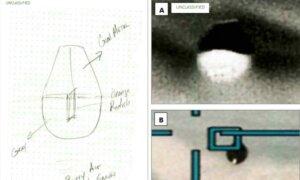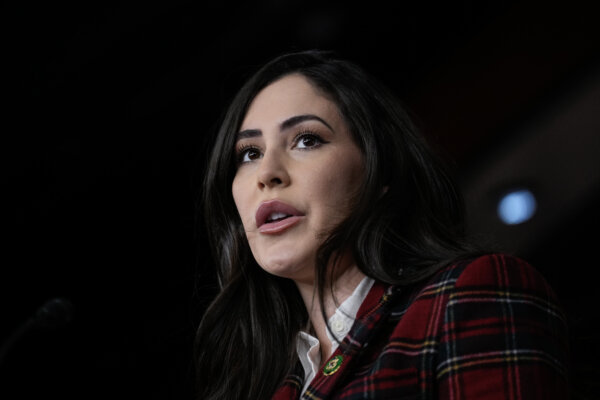5 Takeaways From Congressional UFO Hearing
Witnesses described a climate of ‘over classification’ of anything related to UFOs, or UAP, from the U.S. government.
A bipartisan group of lawmakers hosted a congressional hearing on unidentified anomalous phenomena (UAP), formerly referred to as UFOs, on Nov. 13. Witnesses testified on the threat to national security from potential incursions into U.S. airspace while criticizing the Pentagon for shrouding many UAP documents in secrecy.
Among the topics discussed were congressional lawmakers’ ongoing bipartisan interest in UAP, NASA’s potential role in reporting sightings, the origins of the alleged craft, and the Pentagon classifying and restricting access to UAP documents and materials.
While a previous hearing last year was heavy on speculation into alleged non-human life, or extraterrestrials, this week’s hearing went further into the impacts of the Pentagon’s alleged secrecy regarding UAP sightings and how that might breach congressional oversight.
“One of Congress’s most important responsibilities is oversight of the executive branch in general and the military and intelligence community in particular,” Shellenberger said. He believes the government is unconstitutionally usurping congressional authority by withholding that information.
Here are five takeaways from the Nov. 13 congressional UAP hearing.
1. Ongoing Bipartisan Interest From Congress
The bipartisan UAP caucus—Mace, Rep. Tim Burchett (R-Tenn.), Rep. Andy Ogles (R-Tenn.), Rep. Anna Paulina (R-Fla.), Rep. Eric Burlison (R-Mo.), and Rep. Jared Moskowitz (D-Fla.)—were joined by other House members on Wednesday for the nearly two and a half hour hearing.
Mace, concerned that the U.S. government is withholding UAP materials it has officially compiled since the 1940s, said Congress and the public deserve to know what the government’s taxpayer-funded research on the topic has yielded, even if they are dead ends.
“If we’re spending money on something that doesn’t exist, why are we spending the money? And if it does exist, why are we hiding it from the public?” Mace asked. She said national security is at stake if those objects are the technology of foreign adversaries.
The possibility that some UAP, including those in videos released by the Pentagon, could be foreign technology, was echoed by Ogles.
“It is clear, from my experience and what I’ve seen, that there is something out there. The question is, ‘Is it ours, is it someone else’s, or is it otherworldly?’” Ogles asked.
Any attempts to restrict Congress from gaining access to that information would be criminal, he added.
The Pentagon’s All-Domain Anomaly Resolution Office, which is tasked with studying and cataloging UAP reports, has hundreds of sightings that remain “uncharacterized and unattributed” while displaying “unusual flight characteristics or performance capabilities,” Rep. Robert Garcia (D-Calif.) said.
“Now, we shouldn’t prejudge what they might be. I’m certainly not going to. We need evidence that we are detecting things, and we know that we don’t understand them, and this is worth investigating,” he added.
2. Elizondo Testifies
Elizondo, one of the key witnesses at the hearing, is famous for feeding the story of the Pentagon’s former UFO program to The New York Times in 2017.
That article resulted in a resurgence of public interest and media reporting on UFOs, and was accompanied by several Department of Defense fighter jet videos that purportedly showed unidentified craft.
Elizondo said on Wednesday that some UAP are “advanced technologies not made by our government or any other government” but that both the United States and its adversaries are in possession of “UAP technologies.”
“I believe we are in the midst of a multi-decade secretive arms race, one funded by misallocated taxpayer dollars and hidden from our elected representatives and oversight bodies,” he said.
Elizondo has claimed since 2017 that he was previously the director of the Pentagon’s 2009 UFO program, which was officially called the Advanced Aerospace Weapons System Application Program.
“Luis Elizondo had no assigned responsibilities for AATIP while assigned to OUSD(I) [Office of the Under Secretary of Defense for Intelligence],” Pentagon spokesperson Susan Gough told The Epoch Times.
3. NASA’s Role in UAP Reporting
Gold, who was also a member of NASA’s UAP Independent Study Team, told Congress that commercial airline pilots need an official database to report potential UAP sightings. He suggested that his former employer’s Aviation Safety Reporting System (ASRS) is a good place to start.
“This system, which is administered by NASA and funded by the FAA, provides a confidential means for reporting of safety violations in a voluntary and non-punitive manner,” Gold said. “Over 47 years, the ASRS has collected nearly 2 million reports. ASRS is the perfect tool to collect UAP data, which could then be collated by NASA and shared with the public at large.”
NASA is already one of the most respected U.S. agencies, Gold added, which gives it a unique position in reestablishing the public’s trust in the government and UAP.
“For relatively little cost and effort, NASA could create an AI [artificial intelligence] or ML [machine learning] algorithm that could search the agency’s archives for anomalous phenomena.”
4. Aliens, Drones, or Something Else?
While this year’s UAP hearing was lighter on speculations of non-human intelligence, the topic was still addressed.
Mace probed Elizondo about purported UAP crash retrieval programs in the U.S. government, a central topic of discussion in last year’s hearing. Elizondo answered in the affirmative when asked if those programs were “designed to identify and reverse engineer alien craft.”
“In regards to these aircraft being piloted by whatever they might be—non-human biologics—would you agree that it’s likely that they are being piloted by some mind-body connection?” Luna asked.
Elizondo, who emphasized that he was more interested in the objects’ flight characteristics than speculating on their origin, said it was safe to presume intelligent control of some kind because they “seem to anticipate [pilots’] maneuvers.”
Garcia asked all four witnesses what could be the source of UAP. Both Gallaudet and Elizondo said nonhuman, higher intelligence, but Shellenberger and Gold said they don’t know.
“I think we must be modest in our assumptions that we’re looking for intelligence that could be biological. It might not,” Gold said. “But I think the ultimate answer is going to surprise us all.”
The Pentagon said earlier this year, even among its unsolved cases, “if more and better quality data were available, most of these cases also could be identified and resolved as ordinary objects or phenomena.” Those could be drones, satellites, or even meteorological events, it said.
5. The Pentagon’s Role in UFOs/UAP
The witnesses and lawmakers present agreed that the Pentagon has been “over-classifying” documents and materials related to UAP sightings, which sometimes get labeled “top secret” and are not subject to the Freedom of Information Act (FOIA).
“For what purpose is the federal government over-classifying? Because that’s what they’re doing. They’re over-classifying and forbidding the public from getting access to this.” Rep. Andy Biggs (R-Ariz.) said.
Elizondo offered two explanations. For one, it could be a holdover policy from the Cold War, when the United States didn’t want to reveal to the Soviets our awareness of foreign military technology or disclose our own. The Pentagon might also be uninterested in revealing information related to problems—including foreign incursions into U.S. airspace—they lack answers for, Elizondo added.
Shellenberger mentioned government researcher John Greenewald Jr., who runs The Black Vault, an online database of more than 3 million government documents obtained through FOIA requests.
Greenewald says that the government has often denied the existence of specific UAP records, only to admit they exist after he files a FOIA appeal. But in one case, the Navy responded that the videos contain sensitive information, are classified, and exempt from disclosure.
The Navy, for instance, falls back on its UAP Security Classification Guide for denying many FOIA requests, Greenewald told The Epoch Times. The guide says any UAP information obtained or developed through the use of classified sources or methods will receive the highest classification level applicable. The Pentagon has a similar policy.
When the Pentagon declined to release video footage from U.S. fighter jets shooting down suspected UFOs over Alaska in 2023, the Defense Department said the footage remained classified.
“When you get into over secrecy, over classification, them not wanting to be open and honest about things—whether it be about UAP or anything for that matter—the public trust erodes,” Greenewald said.
In response to a request for comment from The Epoch Times, the Department of Defense said it takes public interest in UAP seriously.
“The department is fully committed to openness and accountability to Congress and the American people, which it must balance with its obligation to protect sensitive information, sources, and methods,” Gough said.






